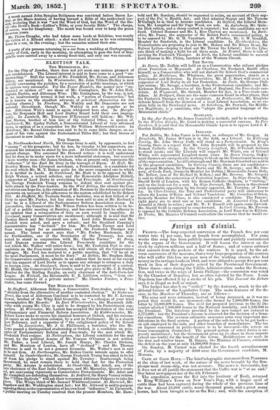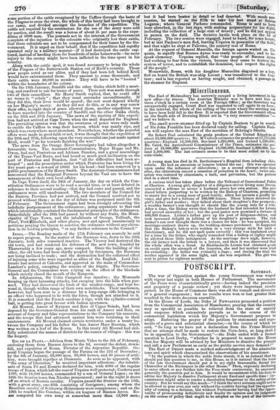,fratign uu tulunial.
FRANCE.—The long-expected conversion of the French five per cent rentes into 41 per cent, has at length been accomplished. For some weeks this coup has been publicly announced and publicly contradicted by the organs of the Government. It will lessen the interest on the stock by eighteen millions and a half of francs; and of course subtract that amount from the pockets of the rentiers. It is urged, by the ad- verse canvassers of the measure, that a very large proportion of the rentiers who will suffer this loss are poor men of the working classes, who had money in the savings-banks in 1848, and were obliged to accept five per cent stock in lieu of their deposits seized by the Provisional Government. Three times—once during the Villele Administration under the Restora- tion, and twice in the reign of Louis Philippe—the conversion was voted by the Chamber of Deputies, but as often rejected by the Peers. Louis Napoleon has effected it by a stroke of his pen. The Journal des Debate says it is illegal as well as unjust. The budget has also bon "settled" by the Autocrat, much to the ad- ditional leisure of the Legislative Corps. The main features of the de- cree, in the Moniteur of Thursday, are as follows—
The army and navy estimates, instead of being decreased, as it was re- ported they would be, are increased—the former by 7,000,000 francs, the latter by 12,000,000 franca. The civil list prepared previous to the 2d De- cember allotted 7,800,000 francs to the National Assembly, and 1,248,000 to the President. The dotations provided by the new budget are reduced to 5,775,000; but the President's income is reserved for the decision of a Sena- tes consultum. The revenue estimates announce some very important mo- difications in the fiscal system. A portion of the salt-tax is to be got beck- on salt employed in the "soda and other branches of manufacture. The tax on liquors consumed in public-houses is to be increased—the octrms on home consumption diminished. The general system of octroi duties is ex- pressly maintained ; but the Government gives up its share in those imposts (about one-tenth) for the benefit of the towns. Modifications are made in the door and window taxes. M. Bmeau, the Minister of Finance, estimates the deficit on the jear at only 14,000,000 francs. On Sunday, M. Carnet was elected for the fourth arrondissement of Paris, by a majority of 3000 over the Government candidate, M. Moreau.
CAPE OF GOOD Horn.—The brief telegraphic statement from Penzance at the dose of last week, of the nature of the news brought by the Boo- pholps mail steam-ship, was not accurate. The news is favourable, but it does not at all justify the statement that the Caffre war is "at an end." Our latest newspapers are of the 4th February. The expedition across the Kei into the territory of Krell, returned to King William's Town on New Year's Day, with a larger spoil of cattle than had been captured during the whole of the previous time of the war. About 23,000 cattle, many thousand goats, and a great many horses, had been brought as far as the Kei ; and, with the exception of some portion of the cattle recaptured by the Caffres through the haste of the lingoes to cross the river, the whole of this booty had been brought to our camp, and divided amongst the branches of the expedition. The cattle not required by the contractors for the use of the army were sold by auction, and the result was a bonus of about 21. per man to the expe- dition of 5000 men. The journals not in the interest of the Government complain of the injustice to the colonists who originally lost their cattle, that these colonists are not to be compensated for their losses by the Go- vernment. It is urged on their behalf, that if the expedition had rapidly operated only in a military manner—if it had destroyed the cattle cap- tured, instead of herding them for hundreds of miles homewards—far more injury to the enemy might have been inflicted in the time spent in his country. Along with the cattle spoil, it was found necessary to bring the whole of the Fingoes of the Butterworth Station out of Krell's country. Those poor people acted as our allies, and if they had been left behind Krell would have exterminated them. They amount to some thousands, and their cattle were 30,000 in number. They will have to be "located" within the boundaries of the colony. On the 16th January, Sandilli and the other Gaika chiefs held a meet- ing, and resolved to sue for terms of peace. Their suit was made through two of their councillors. Sir Harry Smith replied, that, he could offer no terms to " rebels" ; that they must surrender unconditionally. If they did this, their lives would be spared ; the rest must depend wholly on her Majesty's mercy. As they did not do this, or in any way renew their offer, in eight days of grace allowed them, another expedition was to have marched into the country of Sandilli and the other Gaika chiefs, on the 26th and 27th January. The news of the starting of this expedi- tion had not arrived at Cape Town when the mail departed for England. The prevailing opinion was that the overtures of peace were only made to enable the Caffres to reap their harvest, which was nearly ripe, and which was everywhere most abundant. Nevertheless, whether the peaceful offers were made in good faith or not, it was thought that the expedition of the 26th and 27th, following upon the very successful one just made against Krell, would "go far towards finishing the war." The news from the Orange River Sovereignty had taken altogether a favourable turn. The Assistant-Commissioners, Major Rogge and Mr. Owen, had met Prastorious and Adriaan Standen, and a great assemblage of the Trans-Vaal Boers, and had found so much good inclination on the part of Prestorius and Standen, that "all the difficulties had been ar- ranged " ; and the proscription under which Prtetorius has been living for five years past—a reward of 10001. for his head—had been removed by a public proclamation of Sir Harry Smith. The Assistant-Commissioners had announced that the Emigrant Farmers beyond the Vaal are to have the management of their own local affairs. In Cape Town itself, the 28th of January, the day on which the Con- stitution Ordinances were to be read a second time, or at least debated in reference to their second reading—that day had come and passed, and the ordinances were still unadvaneed. The two members of the Council for the Eastern Province had not arrived, and the Council resolved not to proceed without them ; so the day of debate was postponed until the 6th of February. The Government organ had been strongly advocating the indefinite postponement of the ordinances ; using arguments to that end which intentionally combated the fundamental principles of the ordinances. Iiiimediately after the 28th had passed by without any fruits, the Muni- cipality of Cape Town, and the inhabitants of George, Tulbagh, the Pearl, Port Elizabeth, and other places, met and agreed unanimously to petitions praying the Queen to sanction the ordinance without any altera- tion in its leading principles, "or any further reference to the Council."
INDIA.—The Bombay mails of the 17th February can scarcely be said to report progress. In the matter of the Burmese war, down to the 25th January, both sides remained inactive. The Viceroy had destroyed the old town, and had rendered his defences of the new town, founded by Tharawaddy a few years ago, more compact. Since the building of the other, the old town had been chiefly peopled by foreigners, the Burmans not being inclined to trade; and the destruction had the collateral effect of injuring some who were regarded as allies of the English. Lord Dal- housie had arrived at Calcutta, and approved in the main of Commodore Lambert's policy, excepting the seizure of the frigate. The Governor- General and the Commodore were relying on the effect of the blockade which strictly dosed the mouth of the Rangoon.
In Affglimaistan, Sir Colin Campbell was inactive ; the Momunds keeping up their harassing attacks, but escaping into the hills when pur- sued. They had discovered the limit of the musket-range, and kept be- yond it, though within range of their own matchlocks. Their marksmen, however, had been sent to a distance by a long-range rifle belonging to an officer who happened to be with the force, though not attached to it. It is remarked that the French carabine a tige, with the cylindro-conical ball, is getting into great favour with Indian sportsmen. Ali Moored, Ameer of Kyrpore and Reis of Upper Seinde, had been deposed by the Governor-General from his rank of Ameer and Reis, on account of forgery and false representations to the Company his suzerain; and the troops that had advanced against him were returning to their cantonments. Ali Moored claimed certain territories under a treaty be- tween the Company and his father the late Ameer Meer Roostan, which was written on a leaf of the Koran. In this treaty Ali Moored had skil- fully substituted the names of districts for the names of villages : this was the forgery.
Rio DE LA PLATA.—Advices from Monte Video to the 5th of February, enclosing those from Buenos Ayres to the 3d, recount the defeat, down- fall, and expulsion of ROSOA Dictator of the Argentine Republic. Ge- neral Urquiza began the passage of the Parana on the 22d of December ; by the 8th of January, 28,000 men, 60,000 horses, and 60 pieces of artil- lery, were brought together at Diamante. As soon as he appeared, with "the army of liberation," he received important adhesions : the inhabit- ants of Santa Fe and Rosario declared for him, with 4000 of the regular troops of Roses, which left the rear of Urquiza well protected ; Cordova emit 1500, with 19,000 horses, commanded by a son of General Lopez ; on the 10th the frontier town San Nicolao pronounced ; and in the night it drove off an attack of Resists cavalry. Urquiza passed the frontier on the 16th, with a. great army, one-fifth consisting of foreigners ; among whom the Brazilian cavalry of Schleswig-Ilolsteiners were conspicuous ; and on the 19th he reached Rio Conches, within six leagues of Buenos Ayres. Ro- ses computed his own army at somewhat more than 13,000 men; but it had been beaten in detail or had deserted. With much per. suasion, he started on the 27th to take his last stand at Santos Digares; where General Pacheco commanded. Roses is said to have been absorbed, in the last days, with making preparations for his flight, including the collection of a large sum of money; and he did not appear in person on the field. The decisive.battle took place on the 3d of February. The two armies were engaged, hand to band, for some hours • but at last Pacheco's men fled, leaving Urquiza in possession of the field: and that night he slept at Palermo, the country seat of Roses.
At the request of General Mancilla, the foreign agents waited on Pr- guise, to signify that Buenos Ayres was ready to surrender, and to be- speak clemency. Urquiza replied, that "the people of Buenos Ayres had nothing to fear from the victors, because they came to destroy the system of terror, and to reestablish the dominion, and respect the rights of the people." Meanwhile, Row, with his daughter Manuelita disguised as a boy fled on board the British war-ship Locust ; was transferred to the Celt'. tatir ; and is last reported as having sought, and obtained, a passage in the steamer for England.



























 Previous page
Previous page